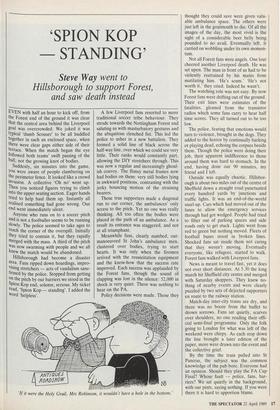`SPION KOP STANDING'
Steve Way went to Hillsborough to support Forest, and saw death instead
EVEN with half an hour to kick off, from the Forest end of the ground it was clear that the central area behind the Liverpool goal was overcrowded. We joked it was typical 'dumb Scouser' to be all huddled together in such an enclosed space, when there were clear gaps either side of their terrace. When the match began the eye followed both teams' swift passing of the ball, not the growing knot of bodies. Suddenly, six minutes into the game, You were aware of people clambering on the perimeter fence. It looked like a crowd invasion. A collective 'Oh no' went up. Then you noticed figures trying to climb into the upper seating section. Eager hands tried to help haul them up. Instantly all realised something had gone wrong. Our end went immediately silent. Anyone who runs on to a soccer pitch and is not a footballer seems to be running Slowly. The police seemed to take ages to reach the corner of the overspill. Initially they tried to contain it, but they rapidly merged with the mass. A third of the pitch was now swarming with people and we all knew the match would be abandoned.
Hillsborough had become a disaster area. Fans ripped down hoardings, impro- vising stretchers — acts of vandalism sanc- tioned by the police. Stopped from getting on .the pitch by our barriers we stood in the Spion Kop end, solemn, serious. My ticket read, `Spion Kop — standing'. I added the word 'helpless'. A few Liverpool fans resorted to more traditional soccer tribe behaviour. They strode towards the Nottingham Forest end saluting us with masturbatory gestures and the ubiquitous clenched fist. This led the police to usher in a new battalion. They formed a solid line of black across the half-way line, over which we could see very little. Their ranks would constantly part, allowing the DIY stretchers through. This was now a regular and increasingly ghoul- ish convoy. The flimsy metal frames now had bodies on them: very still bodies lying in awkward positions, contrasting with the jerky bouncing motion of the straining bearers.
Those true supporters made a diagonal run to our corner, the ambulances' only access to the pitch. Yet no one was really thinking. All too often the bodies were placed in the path of an ambulance. As a result its entrance was staggered, and not at all triumphant.
Meanwhile fans, clearly numbed, out- manoeuvred St John's ambulance men, clustered over bodies, trying to start hearts. It was only when the firemen arrived with the resuscitation equipment and the know-how that the success rate improved. Each success was applauded by the Forest fans, though the sound of clapping was lost in the silence: 52,000 in shock is very quiet. There was nothing to hear on the PA.
Policy decisions were made. Those they 'If it were the Holy Grail, Mrs Robinson, it wouldn't have a hole in the bottom.' thought they could save were given valu- able ambulance space. The others were just left in the goalmouth to die. Of all the images of the day, the most vivid is the sight of a considerable beer belly being pounded to no avail. Eventually left, it carried on wobbling under its own momen- tum.
Not all Forest fans were angels. One lout cheered another Liverpool death. He was set upon. The man in front of us had to be violently restrained by his mates from mutilating him. 'He's scum.' He's not worth it,' they cried. Indeed he wasn't.
The watching role was not easy. By now Forest fans were drifting out of the ground. Their exit lines were estimates of the fatalities, gleaned from the transistor radios which some fans carry to hear half time scores. They all turned out to be too low.
The police, fearing that emotions would turn to violence, brought in the dogs. They added to the horror by continually barking or playing dead, echoing the corpses beside them. Though the police were doing their job, their apparent indifference to those around them was hard to stomach. In the end, having done our 90 minutes, my friend and I left.
Outside was equally chaotic. Hillsbor- ough is about two miles out of the centre of Sheffield down a straight road punctuated every hundred yards by junctions and traffic lights. It was an end-of-the-world snarl-up. Cars which had moved out of the lanes to allow the emergency services through had got wedged. People had tried to filter out of parking spaces and side roads only to get stuck. Lights went from red to green but nothing moved. Fleets of football buses stood in broken lines. Shocked fans sat inside them not caring that they weren't moving. Eventually everyone, like refugees, started to walk. Forest fans walked with Liverpool fans.
News is meant to travel fast, yet it does not over short distances. At 5.30 the long march hit Sheffield city centre and merged with Saturday shoppers. They knew no- thing of nearby events and were clearly puzzled by two sets of dejected supporters en route to the railway station.
Match-day inter-city trains are dry, and there was no booze from the buffet to drown sorrows. Fans sat quietly, scarves over shoulders, no one reading their offi- cial semi-final programme. Only the folk going to London for what was left of the weekend were chirpy. As each stop down the line brought a later edition of the paper, more were drawn into the event and the collective grief.
By the time the train pulled into St Pancras, the subject was the common knowledge of the pub bore. Everyone had an opinion. Should they play the FA Cup Final? Whose fault — police, fans, bar- riers? We sat quietly in the background, with our pints, saying nothing. If you were there it is hard to apportion blame.


































































 Previous page
Previous page